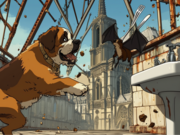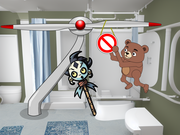ten thousand / a great number
万
=
丆
+
㇆
:
Willy Walrus needs to dig up the floor in the anthill's bathroom, but he is tired of doing so manually with a plough. To make his life easier, he sets up a wind wheel for electricity, connects a neuron to the wind wheel and the plough to transmit the electricity and uses his new DIY electric plough to dig much faster.
definitely / absolutely (not) / (scoffing or dismissive interjection) Yeah, right. / Tut! / to grind / close to / eager / to correspond to / see also 反切[fan3 qie4]
can / may / able to / to approve / to permit / to suit / (particle used for emphasis) certainly / very
可
=
丁
+
口
:
Alternative mnemonic symbol: kebab, from the pronunciation "ke". Karl Marx (k) is preparing a kebab (mnemonic symbol for 可) in the elevator's living room (e3). He also skewers mandarins (口) on the long steel nails (丁) and will only allow (可) his guests to eat the rest of the kebab if they eat their mandarins first.
light / easy / gentle / soft / reckless / unimportant / frivolous / small in number / unstressed / neutral / to disparage
variant of 視|视[shi4] / variant of 示[shi4]
old variant of 視|视[shi4]
to look at / to regard / to inspect
(particle equivalent to 啊 after a vowel, expressing surprise or doubt)
呀
=
口
+
牙
:
Maud Younger (y) has an aching wisdom tooth. She attached a string to it and stands on top of the ashram (a5). At the other end of the string she attached a mandarin (口). When she throws the mandarin down the lighthouse, the string will pull out her aching wisdom tooth. It will hurt a little, so Maud is sure to say "哎呀" when the tooth is pulled.


